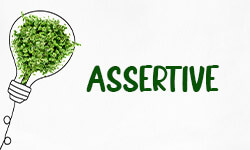
Many individuals often look up English words and phrases to understand their meanings. However, they may unintentionally misuse common words without knowing their true definitions or origins. It can even lead them to misspell words in academic writing, which would be a fatal error. This article aims to provide clarity on the term “assertive” by discussing its accurate spelling and historical background.
Definition of “assertive”
The adjective “assertive” refers to a person’s behaviour or communication style characterized by confidence, self-assuredness, and the ability to express one’s opinions or desires clearly and directly while respecting the rights and opinions of others. The word “assertive” comes from the Latin word “asserere,” meaning “to claim” or “to affirm.” It entered the English language in the early 19th century, evolving to describe a particular style of interpersonal communication.
Use of “assertive” in a sentence
In English, “assertive” functions as an adjective, modifying nouns to describe qualities related to confidence and self-assuredness.
How to spell “assertive” correctly
The word is often misspelled due to the combination of the “ss” and “rt” sequences, which might lead to confusion in typing or writing. Additionally, the “ive” ending is a common suffix, and misspellings may arise from the similarity with other words.
As mentioned earlier, the origin of “assertive” is from the Latin word “asserere,” meaning “to claim” or “to affirm.” It entered the English language in the 19th century, and over time, its usage has become ingrained in discussions about communication styles and interpersonal behaviour.
- “Asserere” – meaning “to claim” or “to affirm”
Correct spelling
assertive
Wrong spelling
assurtive
asertive
assertivee
One way to remember the spelling of “assertive” is to break it down into smaller parts and associate them with the meaning:
- Assert: Focus on the root word “assert,” which means to confidently state or declare.
- -ive: Recognize that “-ive” is a common suffix in English used to form adjectives.
Combining these parts, you get “assertive,” describing someone or something that confidently asserts or states opinions. Creating a mnemonic or association with the meaning can help reinforce the correct spelling in your memory. For example, you might think of someone confidently asserting their ideas when you see or hear the word “assertive.”
Synonyms for “assertive”
Utilizing synonyms for “assertive” aids in broadening language, enhancing communication precision, avoiding repetition and redundancy, tailoring language for diverse audiences or contexts, and enriching stylistic variety in writing. The subsequent sentences feature four alternative terms for “assertive,” each accompanied by illustrative examples.
| Synonym | Examples |
| Assertory | His assertive communication style left no room for ambiguity in the team meeting. |
| His assertory communication style left no room for ambiguity in the team meeting. | |
| Confident | The assertive speaker captivated the audience with a persuasive argument. |
| The confident speaker captivated the audience with a persuasive argument. | |
| Decisive | The assertive leader swiftly made decisions in the face of uncertainty. |
| The decisive leader swiftly made decisions in the face of uncertainty. | |
| Self-assured | Her assertive demeanour conveyed a sense of competence and authority. |
| Her self-assured demeanour conveyed a sense of competence and authority. |
FAQs
“Assertive” refers to a behaviour or communication style characterized by confidence, self-assuredness, and the ability to express one’s opinions or desires clearly and directly while respecting the rights and opinions of others.
An assertive person is confident, self-assured, and able to express their opinions or desires clearly and directly. They communicate with respect for others while standing up for their own needs and rights.
“Assertive” is generally considered a positive characteristic. It involves confident and direct communication while respecting others, leading to the effective expression of one’s opinions and needs. However, the perception of assertiveness can vary based on cultural and situational contexts.
In a sentence, “assertive” is used to describe someone who communicates confidently and clearly, expressing their opinions or desires while respecting the opinions of others.
- ✓ 3D live preview of your individual configuration
- ✓ Free express delivery for every single purchase
- ✓ Top-notch bindings with customised embossing

